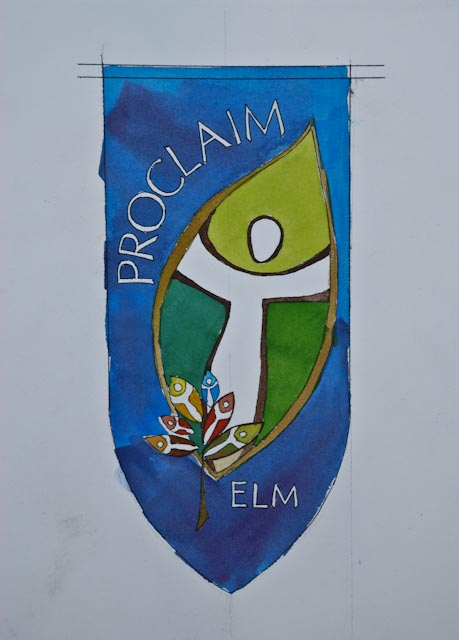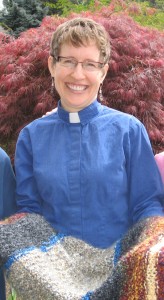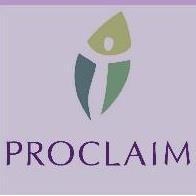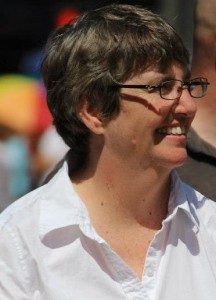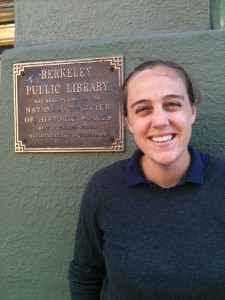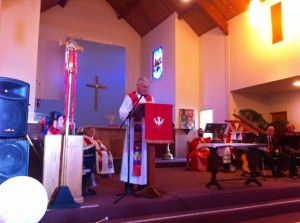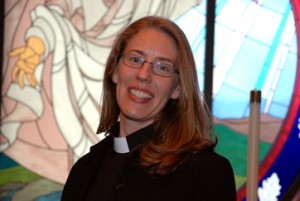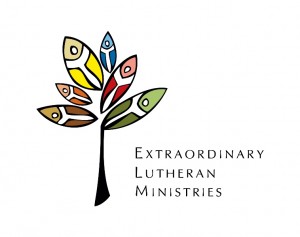 Extraordinary Lutheran Ministries Executive Director Amalia Vagts converses with a supporter about the history of ELM and how Proclaim became a program of ELM.
Extraordinary Lutheran Ministries Executive Director Amalia Vagts converses with a supporter about the history of ELM and how Proclaim became a program of ELM.
Q: First off, congratulations on reaching over 100 Proclaim members!
Vagts: Thanks! We actually have 112 members as of October. It’s really amazing when you realize Proclaim didn’t even come into existence until April of 2011.
Q. Is Proclaim a new name for Extraordinary Lutheran Ministries?
Vagts: I’ve been getting that one a lot lately! Proclaim is a program of Extraordinary Lutheran Ministries, just like Candidacy Accompaniment and Ministry Grants are programs. Proclaim just has a snappy name and logo. We used to build community for LGBTQ leaders through the ELM Roster. Following the ELCA policy changes, we wanted to open that up. We launched Proclaim in April of 2011 as a community for Lutheran rostered leaders and seminarians who publicly identify as LGBTQ.
Q: Can you walk me through some of the history of Extraordinary Lutheran Ministries?
Vagts: Yes, Extraordinary Lutheran Ministries formed in 2007, as the result of a merger between Lutheran Lesbian & Gay Ministries and the Extraordinary Candidacy Project. We’ve actually been working with LGBTQ people called to Lutheran ministry for almost twenty years.
Q: Tell us about it.
Vagts: We started as Lutheran Lesbian and Gay Ministries in 1990. Originally the focus was supporting the ministry of openly gay and lesbian pastors in the San Francisco area. The early efforts came from both the pastors themselves and also allied pastors and lay leaders who knew the church needed visible gay and lesbian pastors and felt it was an injustice that the ELCA required celibacy for gay and lesbian people. It was a frustrating and disheartening time for so many people who felt called by God, but knew there would not be a place for them to serve in the ELCA. This movement was a positive and hopeful response.
Q: Where does the phrase “extraordinary ordination” come from?
Vagts: Right–everyone wants to know if it means we think we are totally fabulous! But it was Krister Stendahl, a bishop, theologian and professor of Lutheran history who helped coin the phrase “extraordinary ordination” based on Martin Luther’s own instructions for ordaining pastors outside the “ordinary” system. In his day, Luther encountered bishops he felt were working “contrary to the gospel.” When those bishops would not ordain candidates congregations wanted to lift up, Luther taught the congregations could ordain those pastors. Bp. Stendahl used the phrase “extra ordinem” to describe the first ordinations of openly gay and lesbian people. We think “extraordinary” is a much better word than “irregular” or “unauthorized!” In 1990 St. Francis Lutheran in San Francisco called Ruth Frost and Phyllis Zillhart, a lesbian couple, to be their pastors and First United Lutheran of San Francisco called Jeff Johnson, a gay man. About 1,000 people gathered together on January 22, 1990 at St. Paulus Lutheran Church to participate in the joint ordination of these three. All three had met every other qualification of ELCA ordination, except for their refusal to live as celibate gay or lesbian candidates.
Q: What a courageous act!
Vagts: I live in amazement and some envy of those who were involved at that time. It was a remarkable witness to the church and to LGBTQ people and allies everywhere. Both churches were suspended and eventually expelled from the ELCA for their actions. And this prophetic act became a movement. Between 1990 and 2009 eighteen people were ordained extraordinarily—including one person in Canada. The congregations and ministries that called these leaders recognized the gifts of the candidates and knew they were the right fit for their congregations. Over the years Lutheran Lesbian & Gay Ministries raised over $750,000 to support the congregations and ministries calling these pastors.
Q: How does the Extraordinary Candidacy Project fit in?
Vagts: While at first the movement was working with people who had been approved for ordination, it was soon clear that gay and lesbian people were being removed during the candidacy process too. Following the 1990 extraordinary ordinations, a student at Pacific Lutheran Theological Seminary named Bill Kunisch preached a sermon in his home congregation. He spoke in support of St. Francis and First United and this started raising a bunch of problems for him. The president of his home congregations challenged him, and when he got back to seminary, he was called in for a meeting with his candidacy committee. They asked him if he was gay. When he refused to answer their question because he thought it was uncalled for, his home congregation removed their sponsorship of him and he was eventually removed from the ELCA candidacy process. A group of people jumped in to respond and created the Extraordinary Candidacy Project, which became a pathway to candidacy for LGBTQ people who were otherwise fully qualified for ministry in the ELCA. This candidacy process was a pathway both for those who were or hoped to be extraordinarily ordained and people who had been removed from the ELCA roster, but wanted to continue or return to ministry in the Lutheran church. Eventually, the group also formed its own clergy roster, known as the ECP Roster.
Q: And then these two groups merged in 2007? Why?
Vagts: We merged the efforts of these two organizations into Extraordinary Lutheran Ministries in order to best support these candidates and the churches who called them. We were trying to reform the ELCA, but we were also experiencing a real movement of a growing number of congregations willing to challenge church policy in order to call LGBTQ rostered leaders. We had begun to believe this was going to be a very long-term movement, rather than a temporary one. With limited resources, we decided it was more important to focus on finding calls for LGBTQ people and making ministry happen, rather than on changing the policies of the ELCA.
Q: Then 2009 Churchwide Assembly happened and suddenly the ELCA as a national denomination is agreeing to ordain people who are relationships.
Vagts: This was a really significant shift, one we had been working for and one we weren’t convinced would happen. It was a bittersweet time though—many people thought about how many people never lived or stayed in the church long enough to see that change. It was also, as the late Bp. Egertson described it “half a loaf.” The decisions only addressed part of issue and focused primarily on gay and lesbian people. The church was opening the door, but they hadn’t exactly laid out the full welcome mat. And you can imagine, we were a little concerned the decisions wouldn’t hold. And of course we wondered, would anything really change?
Q: The ELM roster had been such a place of resistance and “outsider status.” Now you were going to be invited in?
Vagts: We weren’t sure at first what would happen. But we did know that our work would change. At our board meeting that fall, we examined the needs of LGBTQ rostered leaders and those following a call to ministry. We also thought about what ELM had to offer this group. We realized a couple of things: 1) the church had changed; 2) our programs needed to shift; 3) we still had a lot to offer the church. We knew that our core work to provide community for LGBTQ rostered leaders, support for those in candidacy, and direct financial investment in congregations and ministries calling LGBTQ people was still needed. But for the time being, it was clear that extraordinary candidacy and extraordinary ordinations were not the primary need for this community. And now we were meeting pastors who had remained in the closet after being ordained, pastors who could finally come out. There had been some separation over the years between those who had chosen different routes and we had a dream that we could find a way to bring these leaders together into one community. That vision of a new community for rostered leaders of diverse sexual orientations and gender identities led to the launch of Proclaim.
Q: I would think the majority of ELCA congregants have no idea of this struggle.
Vagts: I’ve really been amazed over the years how few people in the church know the stories of LGBTQ pastors in this church. And even after the 2009 changes, many people thought all the ELM pastors were just automatically added to the ELCA roster. They actually each had to go through an individual candidacy process. I think the ELCA worked to make it a welcoming process, but for many people it still took a lot of personal strength to go through that. But we had to recognize that the church was changing. I remember so clearly when we were discussing what would become of ELM and the Rev. Jeff Johnson said, “It’s a new day.” I’m constantly inspired when I think about Jeff—someone who was told “NO” by the church for so many years, but who kept saying “YES” to Jesus. So to have him jump into the changes and embrace the journey meant a great deal. It really was a new day for us and for this denomination.
Q: A denomination who is still settling down after this landmark decision. Congregations split up over this decision. And congregations can still refuse pastors just for being gay or lesbian.
Vagts: There is still a lot of work to do. There are still very clear barriers to LGBTQ people seeking to respond to God’s call to ministry. For example, we need more congregations who truly welcome publicly identified LGBTQ ministers. This is about working for justice and living out the vision of the Kingdom of God. The people who worked for this reform have a vision of a more inclusive church, of a place where all of God’s people are welcomed and received God’s grace and love. And the members of Proclaim are in a terrific position to help that happen. We can model and preach God’s love. We have a story to tell of how God called each one of us to ministry, and how we have had to come to understand ourselves—to “claim our wholeness” as the St. Francis Eucharist blessing goes. That journey needs to be shared with the church and really with society too. For far too long, Christians have been at the front of messages that tell people their sexual orientation or gender identity is wrong or sinful. Now Christians need to be at the front of messages telling God’s truth—all of God’s children are beloved. LGBTQ pastors, AIMS, deacons and deaconesses can inspire the church to be more loving and inclusive because we have experienced grace in deep, surprising, complicated ways. And LGBTQ ministers are an important witness to others who have also felt at the margins of the church.
Q: Say more about ELM’s relationship with the ELCA? Is there a formal connection?
Vagts: Extraordinary Lutheran Ministries continues to be a reforming movement within the Lutheran church—and not just the ELCA. While it’s certainly a main focus of our work, Proclaim and our other programs are actually open to all Lutheran rosters. We don’t receive funding from the ELCA. However, we are together on this journey, connected by faith. We are working in partnership to help the ELCA continue to become a more fully inclusive place for LGBTQ rostered leaders. The good news is that many Proclaim rostered leaders are busy doing a wide variety of ministry in this church. The real news is also that some in the Proclaim community are really struggling to find calls—and a good portion of the Proclaim community is in seminary with an unknown journey ahead.
Q: So those on the outside are now working to open the church to others and ministering to the very people who wanted to keep them marginalized?
Vagts: That’s the idea. It’s how God has been working since the beginning of time. When a candidate is ordained, they promise to serve the whole church. And here we are.
Q: I can really see that in the name “Proclaim.”
Vagts: Yes. It was the Rev. Jen Rude who came up with name Proclaim and we all immediately loved it. The mission of these leaders and for all of us is not to look inward and focus on ourselves. It is to proclaim the Gospel of Jesus Christ… 2 Corinthians 4:5 says, “For we do not proclaim ourselves, we proclaim Jesus Christ as Lord and ourselves your servants for Jesus’ sake.”
Q: It’s an incredible story. Thank you.
Vagts: Glad I could share it. Thanks!
Amalia Vagts began as development director for Lutheran Lesbian & Gay Ministries in 2006 and became executive director of Extraordinary Lutheran Ministries following the 2007 merger. She works from her hometown of Decorah, Iowa but can be found travelling the country sharing the work of ELM. Contact her via email director(at)elm.org with questions about ELM or just to say hello.
